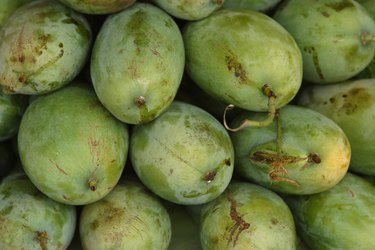
Mango trees (Mangifera indica, USDA hardiness zones 10-12) produce a sweet, juicy fruit by the same name. The plants are tropical to semi-tropical although some newer cultivars have shown some light frost tolerance. Flowering and fruiting can be negatively affected in temperatures below 40 degrees Fahrenheit and the plant will be killed when temperatures drop to 30 degrees. The fruit ripens best on the tree in 100 to 150 days from flowering. Early mango fruit drop may be due to temperature changes or disease.
The Two Races of Mango Trees
Video of the Day
There are two races of mangoes. One is from India and the other is from the Philippines and southeast Asia. The Asian varieties are more tolerant of excess moisture and have some mildew resistance. The Indian varieties are more sensitive to wet soils and foliage. The weather must be warm and dry for the fruit to set and do not perform well where there are foggy, cool mornings. The tree can reach up to 65 feet and is an attractive ornamental. The tree gets yellow or red flowers that the tree can self-pollinate without benefit of another mango tree.
Video of the Day
Anthracnose: Likeliest Cause of Splitting Fruit
Texas A&M AgriLife Extension website notes that anthracnose is the most likely cause of mango splitting fruit before it is mature. Anthracnose is a common fungal disease that affects fruit and ornamental trees. The fungus is most active in warm wet conditions and overhead watering is a common cause for its appearance. The leaves will get black spots and small fruits will drop off the tree.
Juvenile fruits split open before they are mature. Fungicide application in early spring has some effect against the disease, as do cultural controls such as watering from the base.
Conditions That Cause Fruit Splitting
The mango tree must be situated in full sun for best fruiting and production. Early season freezes before the fruits have been harvested will split the fruit and damage the harvest. Excess water at the time of fruiting will make the fruits swell too much and burst their skins. The tree must be planted where there is excellent drainage to prevent fruit problems.
Although trees are adapted to growing on many soil types, The University of Florida IFAS Extension website advises that they will struggle when planted on poorly draining soil. The fruit is also affected when a late fertilization takes place at fruit set. This causes a fast flush of growth which can make the skin split on the fruit.
Insect or Other Damage
Mango fruit may split open when they have been damaged by insects. Insects feed and make small entry wounds in the fruit which may not heal over and will elongate and split. Any damage, such as a slice from a sharp branch, can open the fruit up to rot. In this case the tissues will swell and get mushy before the fruit has a chance to grow more and ripen. The fruit is then diseased and the tree will abort it.
Tip
Although fruits ripen best while still on the tree, mangoes do ripen off the tree as well. However, it takes a few extra days for picked fruits to fully ripen.